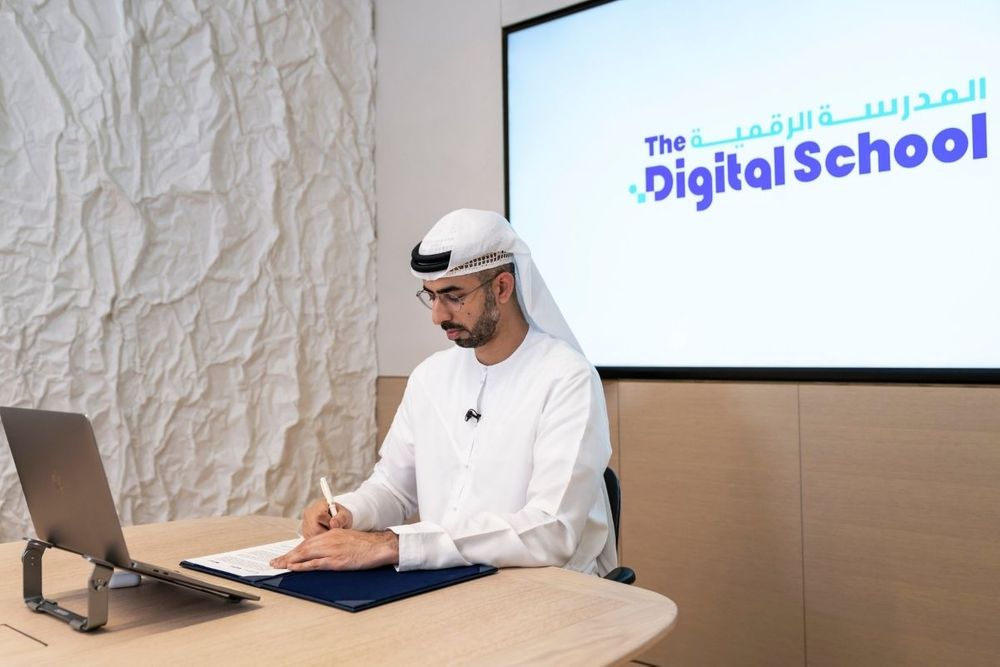The Digital School and Arizona State University (ASU) has signed a Memorandum of Understanding to develop innovative tools and mechanisms to advance digital education in the region and the world.
The agreement was signed by Omar bin Sultan Al Olama, Minister of State for Artificial Intelligence, Digital Economy and Remote Work Applications and Chairman of the Digital School Board of Directors, and Michael M. Crow, President of ASU, in the presence of several officials from both parties.
Under the agreement, the Digital School and ASU will cooperate in designing programmes to develop the capabilities of teachers and digital education providers, exchange knowledge and expertise in learning processes, capacity building and research, and set frameworks for using advanced technology in digital learning for underserved communities.
Arizona State University will accordingly be a strategic partner for the digital school over three years to enable about 1,500 teachers and educational supervisors enrolled in the digital school to grasp the skills required for mastering digital education, granting them accredited certificates.
The university further contributes to developing an advanced programme for digital education in line with the rising demand for digital education materials in various disciplines, conducting relevant studies regarding its outcomes in different stages.
During the virtual signing ceremony, Al Olama emphasised that the coronavirus repercussions highlighted the need for a sustainable digital education ecosystem. He noted that the best-prepared nations succeeded in mitigating the impact of lockdowns through digital tools.
He added that digital learning is advancing around the world with an unprecedented opportunity to reach wider segments of the population, which is a testament to the need to make digital tools readily available, employ advanced technology, and standardise innovative practices. He noted that digital learning must be enhanced by joining forces with academic and educational institutions along with technology and humanitarian sectors to support the United Nations’ Sustainable Development Goals for education.
Al Olama underlined the UAE’s keenness to share its experiences and success stories in employing its technology infrastructure to find innovative solutions that serve communities across the globe.
Al Olama said,
"Expanding strategic partnerships and global alliances to enhance digital education will benefit all parties involved in the Digital School, especially beneficiaries. Such collaborations also contribute to achieving the vision of His Highness Sheikh Mohammed bin Rashid Al Maktoum, Vice President, Prime Minister and Ruler of Dubai, with which he launched the Digital School in November 2020 – to provide equal access to education for all, especially in developing and underserved communities."
Referencing a World Economic Forum report that revealed that the value of the digital education market will reach approximately US$350 billion by 2025, Al Olama said,
"We must collaborate to launch initiatives and join efforts to build on a shared vision – a future of digital education with a resounding impact."
The Digital School and ASU will establish a partnership to support teachers, facilitators and coaches in delivering quality online education to reach the widest segment of students, especially those in low-income communities and refugee camps. The MoU also establishes the foundation for both parties to exchange knowledge and best practices, as well as work on developing innovative digital education tools.
He also added,
"Arizona State University is committed to providing quality education for learners regardless of their geographic location," Crow said. "By partnering with the Digital School, we will advance the access mission our organizations share by bringing ASU Prep Digital’s K-12 education expertise to one million students in remote and developing regions, supporting critical teacher preparation, and leveraging our digital innovation to strengthen vital education pathways around the globe."
"School closures, due to global COVID-19 lockdowns, affected more than 1.2 billion students in 186 countries last year. The availability of solid digital infrastructure enabled some societies to rapidly adapt to the new reality imposed by the pandemic and adopt digital learning solutions. We want to share our lessons learned to help prepare for a complex future,"
News Source: Emirates News Agency









